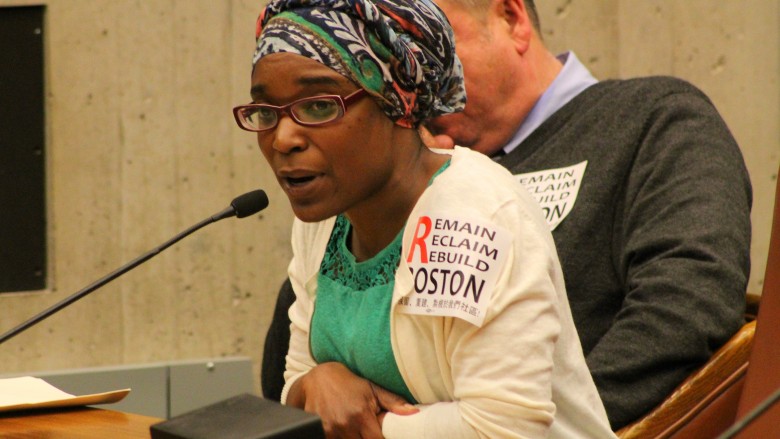Eviction proposal pits landlords against tenant group
By Evan Lips | March 14, 2016, 21:17 EDT
 Lisa Owens Pinto, executive director of City Life/Vida Urbana, testifies before the Boston City Council Monday about a measure governing residential evictions that her organization has proposed. (New Boston Post photo by Evan Lips)
Lisa Owens Pinto, executive director of City Life/Vida Urbana, testifies before the Boston City Council Monday about a measure governing residential evictions that her organization has proposed. (New Boston Post photo by Evan Lips) BOSTON – Hundreds of tenant advocates and wary property owners crammed into a Boston City Council public hearing Monday to weigh in on a proposal that has the two groups at odds: Renters say it would create safeguards against eviction; landlords say it would slap them with thinly disguised rent controls.
“Any way you look at it, this is rent control,” Skip Schloming, of the Small Properties Owners Association, said in an interview just before the hearing started.
At issue is a proposal to create a “just-cause eviction” rule for Boston that would require landlords to state a reason for trying to evict a tenant, such as failure to pay the rent or damaging the property. Advocates say it would preserve landlords’ rights to evict tenants who break lease agreements. Supporters say the measure is needed to protect a rising number of residents who face eviction as property values soar, and that a disproportionate number of tenants at risk are minorities.
“This proposal would just require property owners to provide a good reason to evict someone,” Lisa Owens Pinto, executive director of City Life/Vida Urbana, a tenant advocacy group, said in her testimony to the committee about the measure from her group. “We urge you to file this and pass it this spring.”
But the measure also deals with rents and what would happen if a landlord seeks to increase rental rates.
A revised draft of the group’s proposal, originally submitted as a home-rule petition, wasn’t available at the hearing, however, leaving several councilors perplexed as to why it hadn’t been officially filed.
“We’re talking about a specific proposal and I’m finding it hard to follow because we don’t have the draft in front of us,” City Councilor Josh Zakim said about halfway through the four-hour hearing.
Owens Pinto said her organization’s measure has three central provisions – landlords must provide a reason for an eviction; if a rent increase is sought, a landlord must first notify the city; once notified, the city must use its resources to contact and advise the affected tenant. An earlier version, which has since been dropped, mandated nonbinding mediation for rent increases of 5 percent or more.
The proposal also would require landlords to report to the city whenever a rent hike could result in eviction. The terminology used to describe the procedure is called a ‘no-fault notice to quit.’ Owens Pinto said the measure aims to halt no-fault evictions used by speculators who buy a building, force out tenants then renovate the property and rent to people with higher incomes.
“That’s the essence of what we’re looking for,” she added. “There is no regulation of rent anywhere in this ordinance.”
“This measure, just-cause eviction, specifically targets large corporate investors that are using no-fault eviction as a tool for building clear-outs,” Owens Pinto said. She told councilors she would deliver the revised proposal to them by Tuesday evening.
The first to testify was Sheila Dillon, Mayor Marty Walsh’s housing chief, who outlined the administration’s progress in creating a new arm of City Hall named the Office of Housing Stability. Dillon rattled off city housing statistics: renters make up 70 percent of the city’s 250,000 households, and about 110,000 of the Hub’s apartments renting at market rates.
Dillon pointed out that tenants faced with eviction are often unaware of their legal rights.
“We’re hoping that when residents receive an eviction notice they’ll call our office and get legal assistance,” she added.
Owens Pinto echoed Dillon and said eviction data obtained through Massachusetts Housing Court records doesn’t accurately represent the number of actions taken against tenants because so many don’t contest the orders and move out.
Gilbert Winn, chief executive of Boston-based developer Winn Companies, told the council that a new set of regulations isn’t needed and warned that any changes may have an adverse effect on housing.
“You can’t attack the very thing you are trying to protect, which is the rental economy,” Winn said. His company is a major developer of affordable housing projects.
Winn, the son of WInn founder Arthur Winn, also claimed the proposal would provide tenants with a potential avenue to avoid living up to their rental agreements.
“If a contract between a willing renter and a willing owner cannot be adhered to, and only one party has to adhere to it, then the whole system falls apart,” Winn said.
Contact Evan Lips at [email protected] or on Twitter at @evanmlips.
NBPUrban











